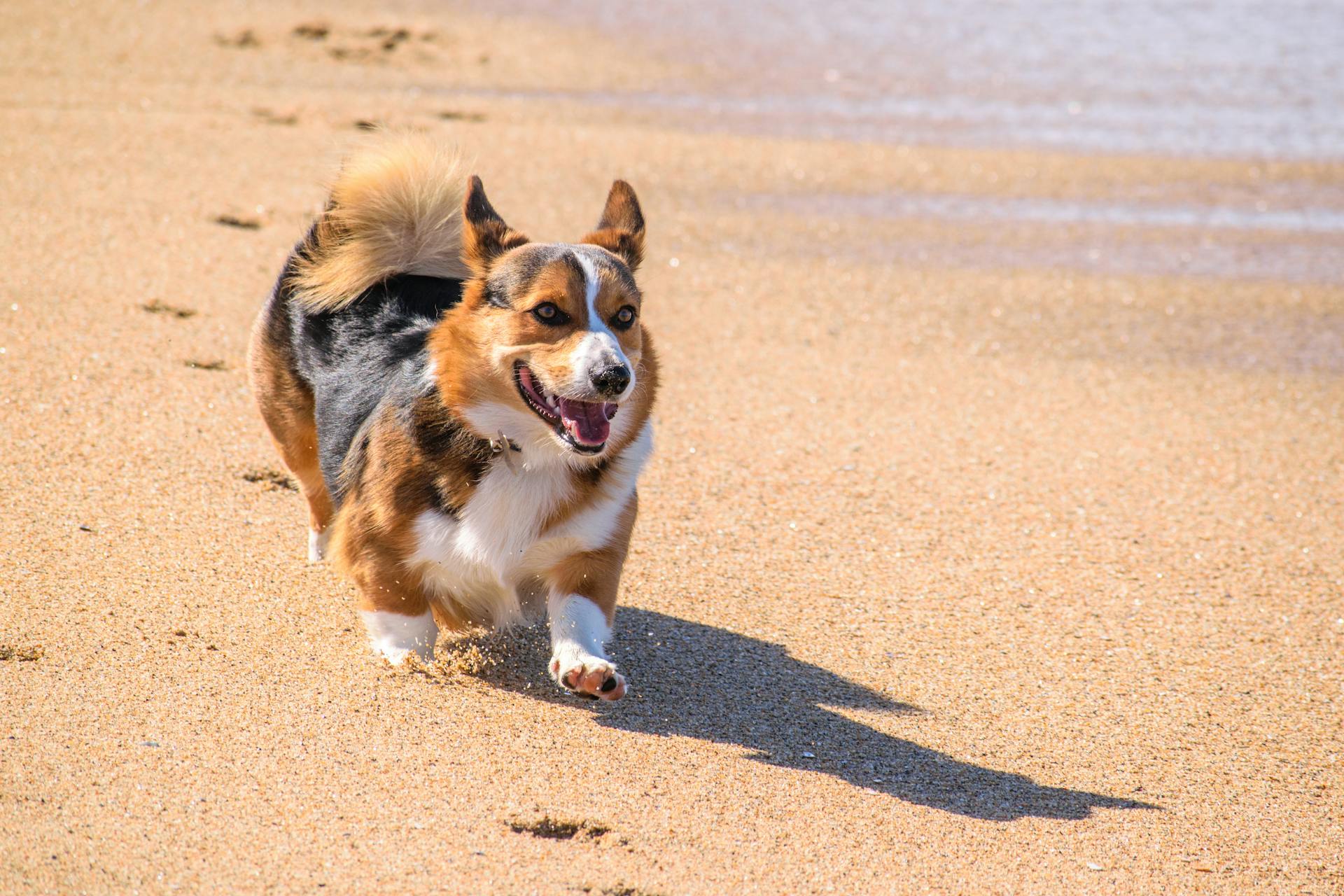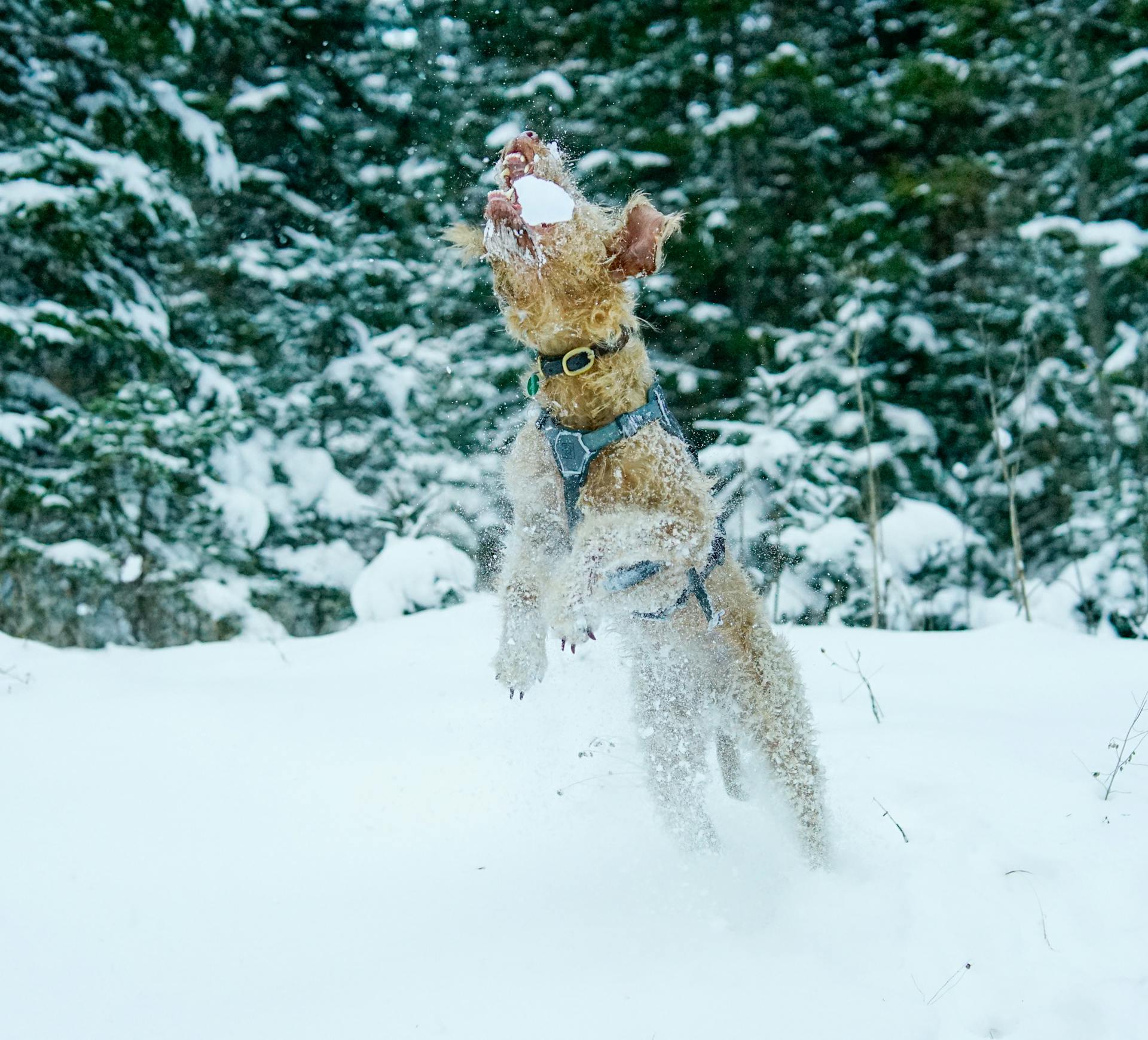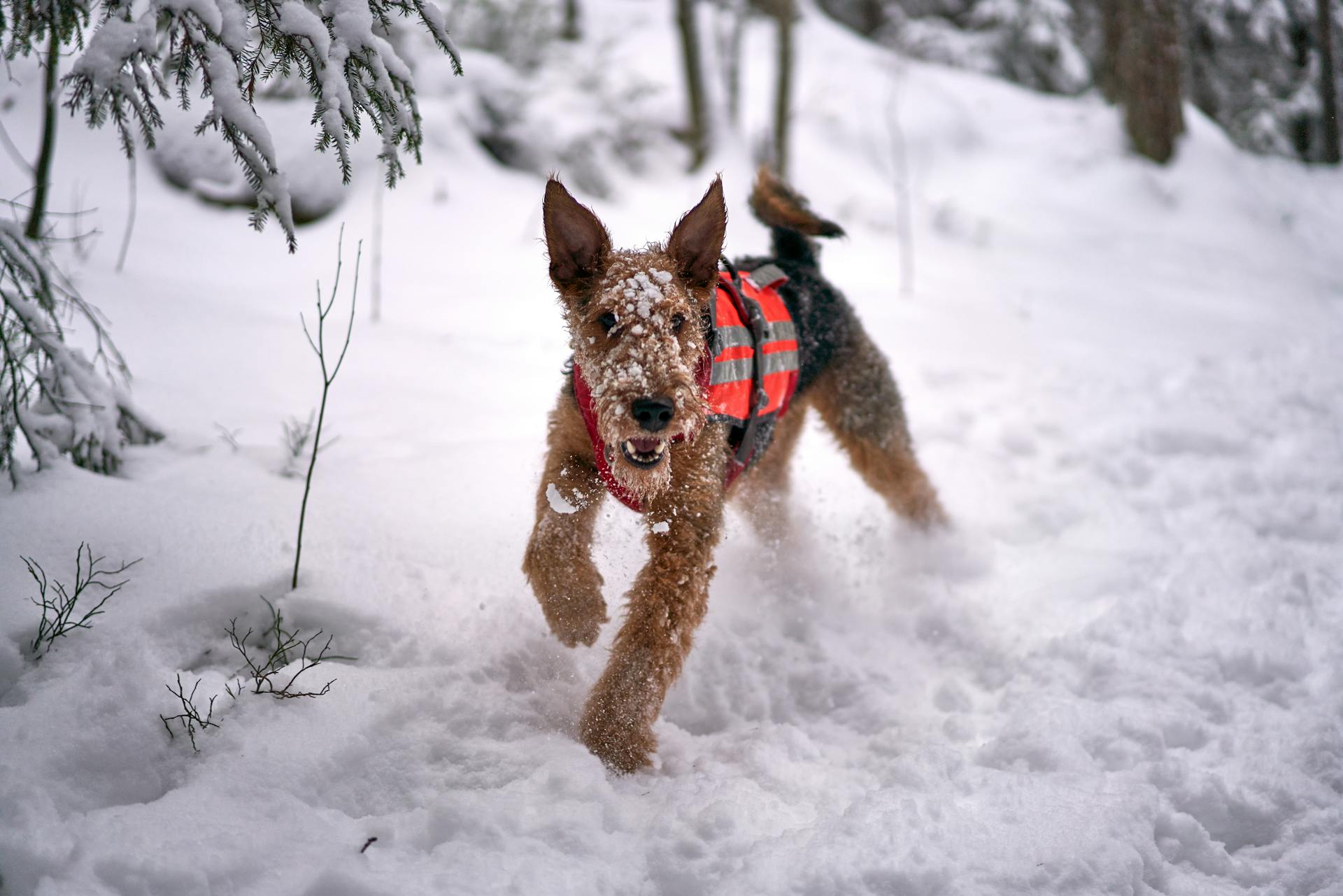
The Welsh Terrier is a small but mighty dog breed that makes an excellent companion for active families. They were originally bred to hunt small game like badgers and foxes.
Their short coats require minimal grooming, making them a great choice for busy owners who don't want to spend hours brushing their dog's hair every week.
Welsh Terrier Care
Welsh Terrier Care is a big responsibility, but with the right approach, you'll be well on your way to raising a happy and healthy pup.
They need regular exercise to stay active and prevent boredom - aim for a long daily walk and some playtime in a fenced backyard.
In fact, they were bred to hunt, so be prepared for a strong prey drive that may lead them to chase neighborhood wildlife if unsupervised.
A professional grooming appointment is needed every two to three months to keep their coat short and tidy.
Brushing their coat at least once or twice a week can also help prevent matting - it's an easy habit to get into, especially during shedding season which occurs two to three times a year.
Welsh Terriers are highly trainable, so take advantage of this by teaching them fun tricks and behaviors that'll keep them engaged.
Diet and Nutrition
Welsh Terriers should be fed a high-quality, small-breed dog food that meets the nutritional standards set by the Association of American Feed Control Officials (AAFCO).
Adult Welsh Terriers need to eat twice daily, while puppies require three or four meals per day to prevent hypoglycemia.
Your veterinarian can help you choose the best food for your dog based on their life stage, whether it's puppy, adult, or senior.
Follow the feeding guidelines on your dog food packaging to determine how much to feed your Welsh Terrier based on their weight.
Adult food has fewer calories than puppy food, so it's essential to measure your Welsh Terrier's food to avoid overfeeding and prevent unwanted weight gain.
Your Welsh Terrier's daily diet should consist of 90% dog food and only 10% treats.
Training and Behavior
Welsh Terriers are a high-energy breed that barks a lot and needs patience and positive reinforcement to curb unwanted behaviors.
Early socialization and training classes with positive reinforcement are crucial at an early age to help keep your dog from barking excessively.
This breed has a strong prey drive because of their hunting history, so it's essential to keep them on a leash or inside a fenced area when outside.
Welsh Terriers respond well to positive reinforcement, such as receiving praise and treats when they behave properly.
They are smart and eager to please, making them usually easy to train with the right approach.
Enrolling your Welsh Terrier puppy in socialization, obedience, and puppy training classes before 16 weeks old is highly recommended.
These classes will help them learn cues and become comfortable around new stimuli, such as children, other dogs, and strangers.
Building a strong recall and reliable cue to leave or drop/swap is key when training your Welsh Terrier.
On a similar theme: How Young Can Male Dogs Breed
Coat Care
Welsh Terriers have a thick double coat that sheds quite a bit.
Their outer coat is wiry and harsh, while their undercoat is smooth and soft.
Professional grooming appointments can help manage their shedding by keeping their coat at a reasonable length.
During shedding season, which occurs two to three times a year, you'll need to hand-strip your Welsh Terrier's dead or loose hairs to prevent matting.
Regular brushing is also essential - aim for at least once or twice a week to keep their coat looking its best.
Exercise and Activity
Welsh Terriers are an energetic breed with incredible stamina, capable of following horses all day and going to ground to work.
They require about an hour of exercise per day, but more is always appreciated. In fact, attempting to physically exhaust one is a foolish endeavor - they'll just get bored!
Daily walks are a must for Welsh Terriers, and the longer the better. They love trying out activities like playing fetch and tug of war.
Here are some fun activities you can try with your Welsh Terrier:
- Long walks
- Running or jogging
- Frisbee
- Chasing a ball
- Barn hunt
Remember, they also need a healthy dose of cardio to stay happy and healthy.
Suggestion: Healthy Bull Terrier
Family and Socialization
Welsh Terriers are a loving breed that can be patient when needed, but they may not tolerate toddler behavior.
They're an excellent companion for children, especially older kids and teenagers, as long as adults supervise their interactions.
You should always teach children how to approach and touch dogs gently, and never leave them alone together.
Welsh Terriers are generally compatible with other dogs if properly socialized or trained, but they may be dog-aggressive if not.
They have a strong prey drive, so it's best to keep small pets that might be viewed as prey out of reach.
Active families who've had experience raising dogs will find Welshies thrive in their care due to their need for constant stimulation.
History and Origin
The Welsh Terrier has a rich history dating back to 1450, when a record of a Welsh poet writing about a Welsh Terrier was made.
These early dogs were used for hunting and vermin control on farms, where they proved to be excellent at catching foxes, otters, and badgers. Their ability to follow horses rather than being carried across the saddle meant they needed legs long enough to cope with rough terrain.
The breed's exacting requirements produced a dog with a weatherproof coat, sufficient stamina to run all day, and a 'never say die' nature when faced with formidable quarry.
You might like: Best Time to Breed a Female Dog
History and Origins

The Welsh Terrier has a rich history that dates back centuries.
Country of origin for this breed is Wales, specifically recorded in 1450.
A broken coated black and tan terrier type was documented in Wales at that time.
These early dogs needed to be agile enough to follow horses across rough terrain while also being small enough to go underground and deal with badgers and other wildlife.
The Welsh Terrier's weatherproof coat, stamina, and fearless nature made them well-suited for this task.
Nigwood Nailer: First AKC Champion
Nigwood Nailer was a remarkable Welsh Terrier who made history in 1901 by winning the 30 Guineas Challenge Cup for the best Welsh, Irish, or Fox Terrier at the Birmingham National Dog Show.
This achievement marked a significant milestone for the breed as it earned Nigwood Nailer the title of first Welsh Terrier to win an AKC Championship.
In doing so, he paved the way for future generations of Welsh Terriers to compete and succeed in dog shows.
Overview
The Welsh Terrier is a lively breed that excels at hunting and digging.
They have a strong prey drive and can be prone to alert barking, so they're best suited for active families who can keep up with their energetic nature.
Welshies typically weigh between 19-22 pounds and live for 12-15 years, making them a long-term companion.
These dogs are intelligent and affectionate, but also independent and sometimes assertive in nature.
A Welsh Terrier's coat is black and tan (or grizzle and tan), requiring regular brushing and coat stripping every eight weeks to maintain its health and appearance.
They're generally low shedders, making them a good choice for people with allergies.
Health and Rescue
Welsh Terrier Rescue Groups are a vital lifeline for these dogs that end up in need of adoption or fostering due to being bought without clear understanding of owning one.
Some Welshies may end up in shelters, waiting for a forever home where they can receive the love and care they deserve.
These situations highlight the importance of doing thorough research before bringing a Welsh Terrier into your family, ensuring you're prepared to provide the necessary care and attention.
Health Issues
The Welsh Terrier is a healthy breed that typically lives 12–15 years. However, they can be prone to certain health issues.
Allergies are a common problem for Welsh Terriers, and there are three main types: food allergies, contact allergies, and inhalant allergies. Treatment varies depending on the cause and may include dietary restrictions, medications, and environmental changes.
Epilepsy is a neurological condition that can cause seizures, which can be frightening to watch but have a good long-term prognosis with proper treatment. Seizures may manifest as unusual behavior or even falling down.
Glaucoma is a painful disease that causes high eye pressure due to improper drainage of fluids, leading to vision loss and blindness. It's essential to recognize the symptoms, such as redness, tearing, squinting, and cloudiness in the affected eye.
Hypothyroidism is a disorder of the thyroid gland, which can cause conditions like epilepsy, hair loss, obesity, lethargy, hyperpigmentation, pyoderma, and other skin issues. It's typically treated with medication and diet changes.
If you're considering getting a Welsh Terrier puppy, make sure to find a reputable breeder who provides health clearances for both parents, including OFA certifications for hip dysplasia, elbow dysplasia, hypothyroidism, and von Willebrand’s disease.
You might like: Bernese Mountain Dog Hip Dysplasia
Rescue Groups
Welsh Terrier Rescue Groups are a vital lifeline for dogs that end up in need of adoption or fostering due to being bought without a clear understanding of what owning one entails.
These dogs may be surrendered by their owners who soon realize they can't provide the necessary care and attention, leaving them vulnerable and in need of rescue.
Adopting/Buying a Dog
If you're interested in adopting a Welsh Terrier, start your search with breed-specific rescues or local shelters - offering a forever home to one can be very rewarding.
Welsh Terriers are a rare dog breed, so it's common for prospective owners to join waiting lists or travel to find puppies. This breed can be more expensive than others, typically costing between $1,000 and $4,000 for a puppy (with some prices ranging higher depending on pedigree and availability).
If you're set on adopting a puppy, research responsible breeders that perform medical tests on litter parents and provide their dogs with a safe, comfortable environment.
These resources are a helpful place to begin your search:
- Welsh Terrier Club of America
- WTCares
- AKC Welsh Terrier Breeders
Frequently Asked Questions
How much does a Welsh Terrier cost?
A Welsh Terrier puppy's cost ranges from $1,000 to $9,000, depending on factors like breeder reputation and parent dog health. Learn about these costs and what they include in our guide to buying a Welsh Terrier puppy.
Do Welsh Terriers cuddle?
Yes, Welsh Terriers are known for their affectionate nature and love to cuddle with their owners. They form strong bonds and thrive on attention from their human companions.
Featured Images: pexels.com


